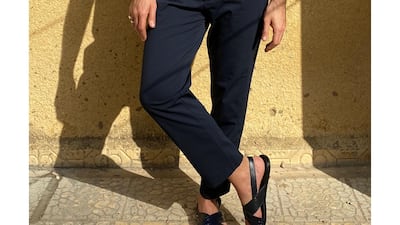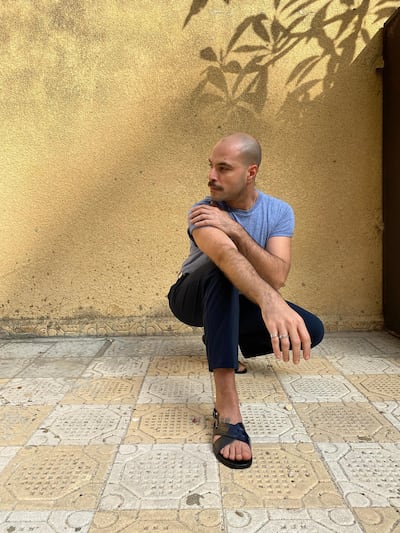It takes seven days for craftsmen to produce a pair of HH – The Brand sandals. In a boutique atelier in the heart of Beirut, “a tiny but mighty team” make each pair by hand, using premium leathers that also happen to be deadstock.
The end results are the epitome of slow fashion. Produced in limited-editions and only available for a single season, each pair of HH sandals is painstakingly made-to-order on site, to reduce the brand’s carbon footprint.
“It was very clear to me when I first started that I wanted to take the sustainable path,” explains Hazem Haddad, a communications expert with a passion for design who founded HH – The Brand.
“Taking care of the environment is a top priority at HH. We produce zero waste. All the leathers are purchased from a couple of stock shops around Beirut. I don’t want fresh leathers – the idea scares me to kill an animal only for their skin. We are also looking into vegan leathers and other materials for the next collections.”
Haddad identified a gap in the market for stylish, high-quality, handcrafted sandals that did not come with a designer price tag. "It started from a simple thought. I've always loved sandals but could never find what I was looking for, so I created it myself," Haddad tells The National.
“While there are great sandals developed by major fashion brands, each are priced at about $700 (Dh2,570). On the other hand, high-street fashion brands are developing sandals retailing around the $70 mark, but are made of very poor-quality elements that damage the feet. I wanted to create a collection of footwear that is minimal, timeless and classic, retailing from $170 to $190 per pair without compromising on the high-grade of materials and craftsmanship.”
It was also an opportunity to reassert Lebanon’s craftsmanship and design capabilities to the world, says Haddad. “Lebanese designers have added so much to the international fashion world with the technical work done by local seamstresses and craftsmen, despite all the challenges faced daily in the country,” he says.
“From the beginning I knew I wanted to produce in Lebanon and nowhere else. It is my goal to continue producing here and showing the world the remarkable things we can do.”
Haddad recently unveiled Collection Two, a line of sandals inspired by the colours of the sea – from "Gitanes" blue and semi-matte navy and black to caviar grey. Made from premium cowhide with finely knit threading and lambskin linings, the sandals come in slip-on and adjustable sling-back versions, and are constructed with leather footbeds and flexible rubber soles to prevent perspiration, slippage and discomfort.
The designs were inspired by a diving trip that Haddad took to Egypt’s El Gouna last summer. “As I descended from the surface into the depths of the sea, my eyes were mesmerised by the different shades of colour, hues of blues transcending into greys and blacks. Underwater everything seems calm, zen and complete. This sensation is represented in Collection Two and is the inspiration defining the collection.”
The designs are only available from designated retailers, including Personage in Riyadh, Homegrown Market in Jeddah, or from the brand's online store www.HHthebrand.com, which offers international shipping. A new luxury retailer in Dubai's Mall of the Emirates will begin stocking HH - The Brand later this summer, while Haddad is also in talks with a couple of high-end retailers in Europe.
Ultimately, he believes that the slow approach that his brand encapsulates represents the future of fashion. "We all want to have pieces that last and are somehow exclusive. The future will have a lot of positive surprises in terms of purchasing."




